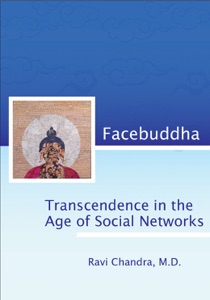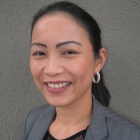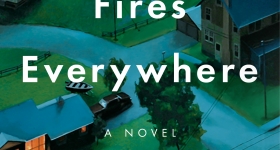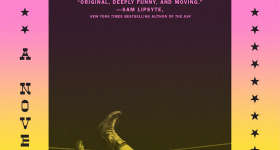Ravi Chandra may be many impressive things – including psychiatrist, award-winning poet, nonfiction author, film critic, Buddhism devotee, and most recently, aspiring chef – but in his opinion, his most notable accomplishment to date is the publication of his latest book: Facebuddha: Transcendence in the Age of Social Networks. “....[b]ecause writing it was a combination of writing a Ph.D. dissertation and a novel!” he says with a smile.
Because he has such wide-ranging interests, it comes as no surprise that his latest book, Facebuddha: Transcendence in the Age of Social Networks, is also an amalgamation of various literary genres. Part memoir, travelogue, introduction to Buddhism, poetic reflection, and well-researched societal critique, Facebuddha is a meditation on the effects of the digitization of our interpersonal relationships and our overwhelming reliance on social networks to create and maintain them.
"The book project started five years ago when I began to notice how big of an intrusion social media was in my life," Chandra says. "I would feel more and more disoriented after engaging with social media... after an hour or so spent online, I often left thinking: where did the time go, where is this leading me? And so I kind of meditated more on the topic. I've found through my psychiatric practice and research that whatever we do changes us. And so if we're spending all our time on Facebook or Twitter to connect, forge relationships, and express ourselves, how does this change us as individuals and how does this change us as a community?"
Chandra was initially working on a travel memoir about his five-month sabbatical through Asia to commemorate his fortieth birthday. He planned the trip to investigate and trace the path of Buddhism from India to Japan, and to discover how countries have reconciled Buddhist philosophies with recurring experiences of war in the last half century. In the middle of that journey, on a Hanoi rooftop, he developed a "deep, warm friendship in a great three-hour conversation" with a woman whose eventual parting words included the question: 'Are you on Facebook?' 'Facebook? What’s that?' he answered. (See the moment captured in his one-minute book trailer on YouTube and Facebook). And thus started Chandra's fraught, ambivalent exploration into the social media universe that has left him seriously questioning its impact on human relationships and connection.
Although Facebuddha contains some of Chandra's ruminations on the possible negative effects of social media, he clarifies that he does not intend for his work to be a kind of "advice" or "self-help" book. "I'm not going to make up people's minds for them on how we want to be with technology and social media," he says." But I do lay out the case that there are challenges especially if your goal is relationship."
"Most of our interpersonal wounds come down to empathic failures," says Chandra. "Racism or sexism, for example, is devaluing somebody from a very self-centered perspective -- so anything that becomes too self-centered becomes an empathic failure to someone else. And I think the only way to address these empathic failures is with actual relationship and actual love," he says.
"Technology can impact individual human relationships by distraction and causing people to miss being present in the real world ... Online relationships and conversations can be largely planned. Of course, it's human nature to always try to control things, but then there's a danger there in trying to over-control. If we're really to be open to relationships, then we should understand that they can make us very vulnerable. And if you over-control and retreat behind computer screens, then you'll lose out on the possibilities that stem from vulnerability, and you won't be as open, which leads to all these subtle ways of turning away from each other," Chandra says.

Chandra also acknowledges the extent to which there can be no control over online discussions at times, which can also hurt interpersonal relationships. "You can't foretell what tragedy or trauma is going to hit you ... A lot of people told me after the elections that social media became very toxic. And I think part of the identity crisis we are having right now over who we are in relationship to each other is causing more polarization. Rather than talking things through with others during times of mistrust, people just hide or unfriend them."
Chandra's focus on relationships and interconnection is very much steeped in the philosophies of Buddhism, which Chandra first encountered in high school after reading Siddhartha. After medical school, Chandra began regularly participating in Buddhist retreats. "That idea of transcending suffering by transcending the ego stuck in my mind," he says. And like many Asian Americans, many of Chandra's own challenges growing up have stemmed from his personal experiences with diaspora and race.
Chandra was born in India and immigrated first to the South as a one year-old and then to Michigan as an adolescent. "As an Asian American, I didn't really fit in and I didn't know why at the time I was growing up," he says. "I was brown in a world of black and white, and I didn't really have a connection to what I was experiencing until I got to college. Finding an Asian American community and discovering Asian American history really opened my eyes," Chandra says.
The intersections of Buddhism and Asian American identity in Chandra's intellectual awakening continue to influence his work beyond his medical practice. Perhaps most notably, Chandra is an avid blogger and columnist for the Center of Asian American Media (CAAM), an organization based in San Francisco that promotes Asian American films.
"I love film... you can see people transform in an hour and a half, and that process of deep exploration and transformation is really appealing to me and it is what's influenced me to go into psychiatry," he says.
When asked about how he prioritizes his time and projects, Chandra insists there’s no conflict. "All my areas of interest are totally complementary and definitely feed into each other... it's all ultimately about understanding people's stories and understanding my own story and trying to help myself and others overcome suffering."
Amid our current day's obsession with social media, Chandra's latest book will educate those in search of an introduction to Buddhism, and interest those who are entertained by travel memoir, interested in psychological research and discussion, or simply eager to improve interpersonal relationships.
***
Facebuddha is available on Kindle, iBooks, Kobo, Nook and hardcover at Amazon, Barnes and Noble and Indiebound. See www.facebuddha.co for more details.
Hyphen readers are invited to use discount code SUPERFAN for $5 off a hardcover copy of the book at Ravi’s Facebuddha launch events on October 23rd and 28th, the first with a conversation with F.B. Steele, M.D., former Executive Director of the C.G. Jung Institute of San Francisco.
On Wednesday, November 8th at 7:30 pm, Ravi will be in conversation with journalist Bernice Yeung at Booksmith’s Bindery.










Comments